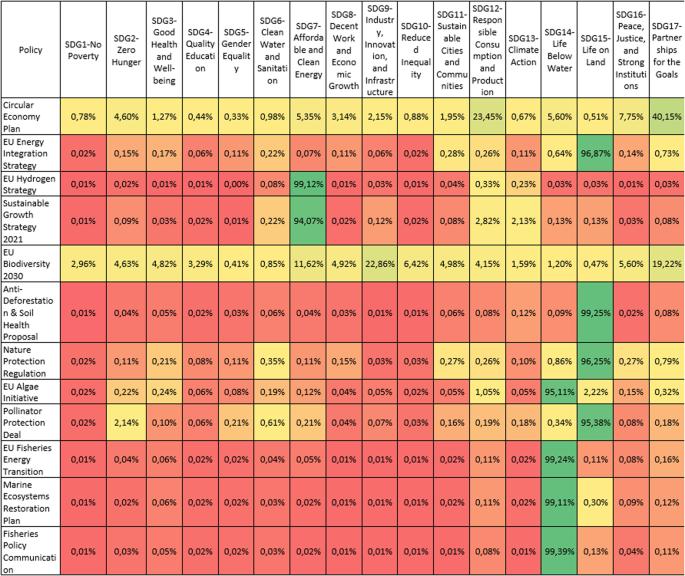Assessing the sustainability of the European Green Deal and its interlin kages with the SDGs
引用次数: 0
Abstract
The European Green Deal (EGD) is the growth strategy for Europe, covering multiple domains, and aiming to an equitable, climate neutral European Union by 2050. The UN Agenda 2030, encompassing 17 Sustainable Development Goals (SDGs), establishes the foundation for a global sustainability transition. The integration of the SDGs into the EGD is an overlooked issue in the literature, despite Europe’s slow progress to achieve the sustainability targets. We employed a machine-learning text-mining method to evaluate the extent of SDG integration within the 74 EGD policy documents published during 2019–2023. The findings reveal a substantial alignment of EGD policies with SDGs related to clean energy (SDG7), climate action (SDG13), and sustainable consumption and production (SDG12). In contrast, there is a significant underrepresentation in areas related to social issues such as inequalities, poverty, hunger, health, education, gender equality, decent work, and peace, as indicated by lower alignment with SDGs 1, 2, 3, 4, 5, 8, 10, and 16. Temporal trends suggest a marginal increase in the attention given to environmental health (especially water and marine life) and gender equality. Furthermore, we illustrate the alignment of EGD policies with the six essential sustainability transformations proposed by the Sustainable Development Solutions Network (SDSN) in 2019 for the operationalization of the SDGs. The results indicate that besides the prevalence of “Energy Decarbonization and Sustainable Industry”, all areas have received attention, except for the “Health, Wellbeing and Demography”. The findings call for a more integrated approach to address the complete spectrum of sustainability in a balanced manner.

评估欧洲绿色交易的可持续性及其与可持续发展目标的相互关系
欧洲绿色协议(EGD)是欧洲的增长战略,涵盖多个领域,旨在到 2050 年建立一个公平、气候中立的欧盟。联合国 2030 年议程包括 17 个可持续发展目标(SDGs),为全球可持续发展转型奠定了基础。尽管欧洲在实现可持续发展目标方面进展缓慢,但将可持续发展目标纳入 EGD 却是文献中一个被忽视的问题。我们采用机器学习文本挖掘方法,对 2019-2023 年间发布的 74 份 EGD 政策文件中的可持续发展目标整合程度进行了评估。研究结果表明,与清洁能源(SDG7)、气候行动(SDG13)以及可持续消费和生产(SDG12)相关的可持续发展目标在很大程度上与 EGD 政策保持一致。与此相反,在与社会问题相关的领域,如不平等、贫困、饥饿、健康、教育、性别平等、体面工作与和平等,与可持续发展目标 1、2、3、4、5、8、10 和 16 的一致性较低。时间趋势表明,对环境健康(尤其是水和海洋生物)和性别平等的关注略有增加。此外,我们还说明了 EGD 政策与可持续发展解决方案网络(SDSN)为落实可持续发展目标而在 2019 年提出的六项基本可持续性变革的一致性。结果表明,除了 "能源去碳化和可持续工业 "受到普遍关注外,所有领域都受到了关注,只有 "健康、福祉和人口 "除外。研究结果呼吁采取更加综合的方法,以平衡的方式解决可持续性的所有问题。
本文章由计算机程序翻译,如有差异,请以英文原文为准。
求助全文
约1分钟内获得全文
求助全文

 求助内容:
求助内容: 应助结果提醒方式:
应助结果提醒方式:


